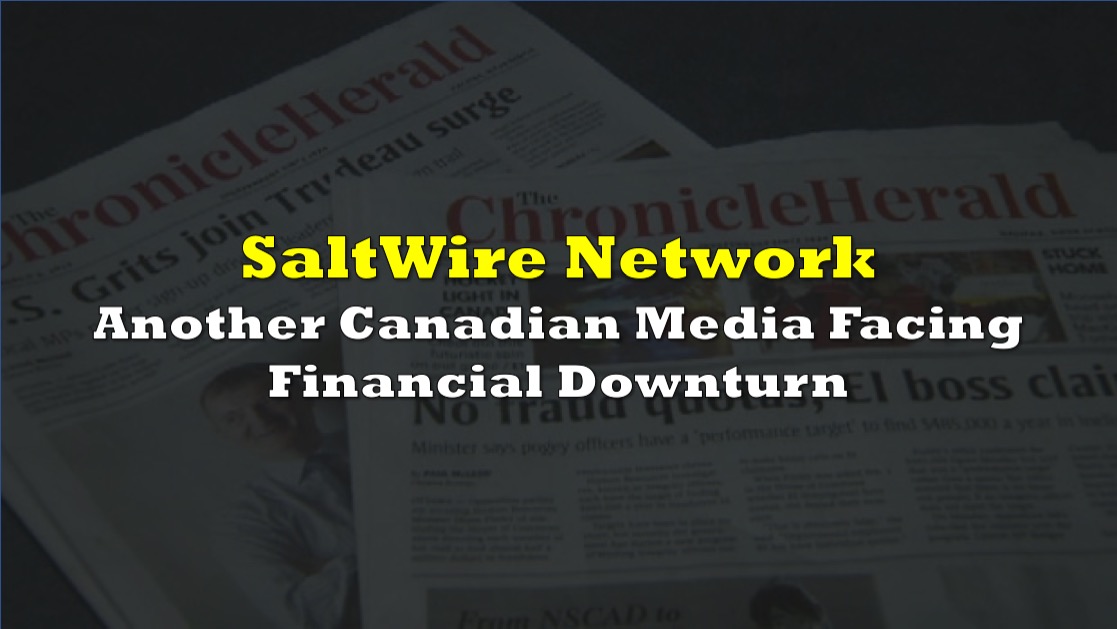SaltWire Network, the parent company of nearly two dozen newspapers in Atlantic Canada, has filed for creditor protection in the Supreme Court of Nova Scotia. Court documents filed on Monday reveal the extent of the company’s financial troubles, with debts totaling almost $100 million.
According to the court filings, SaltWire Network currently has assets worth almost $33 million but is burdened by over $94 million in debt. A significant portion of this debt, approximately a third, is owed to its lender, Fiera Private Debt.
Additionally, the company owes more than $7 million in unpaid HST to the Canada Revenue Agency, and the Chronicle Herald has a debt of $2.6 million stemming from missed pension plan payments.
the stress this gives me as a reporter for Saltwire is unfathomable… and while I'm worried for my job and family, I'm even more worried about how my community will access news. https://t.co/YjlPLRU4RJ
— Sarah Jordan (@sarahhjordan16) March 12, 2024
Fiera Private Debt, through its legal representatives, has expressed concerns over SaltWire’s financial management, alleging that the company has failed to meet its debt obligations consistently over the past five years. Despite Fiera’s ultimatum to submit a plan for repayment by the end of January, SaltWire did not respond, prompting Fiera to seek legal action.
Legal documents filed by Norton Rose Fulbright Canada LLP on behalf of Fiera accuse SaltWire of mismanagement and withholding funds from employees and pensioners. The court was informed that SaltWire had been ordered to pay $500,000 as a security bond in a separate legal matter related to its acquisition of Transcontinental newspapers in 2017. Additionally, the company was fined $70,000 for falling behind on pension plan payments.
This is devastating.
— Arash Madani (@ArashMadani) March 12, 2024
Those atop the Saltwire empire truly have no shame or soul. https://t.co/dXD9cbx6eF
In response to the filing for creditor protection, SaltWire’s chief operating officer, Ian Scott, stated that the move aims to ensure the company’s long-term sustainability.
“SaltWire Network is confident that the … process will enable us to emerge as a stronger, more vibrant media company,” said Scott. “We are dedicated to continuing our legacy of providing insightful, local journalism and contributing positively to the communities we serve.”
This comes just days after another Canadian-based media organization, VICE, has ceased its main operations following a bankruptcy filing.
While the news of creditor protection was met with concern, Willy Palov, president of the Halifax Typographical Union, expressed cautious optimism based on correspondence from the company.
“They acquired a lot of properties from Transcontinental and they have pension debt and tax debt so those are outside our sphere of influence,” Palov said. “We know that those financial challenges are what’s behind what’s going on now and revenues dropping doesn’t help that.”
On the other hand, CWA Canada President Carmel Smyth says the union will keep an eye on SaltWire following the recent developments, asserting that it will “do everything possible to protect their jobs, wages, and pensions” of the members and retirees concerned.
Stephen Kimber, a journalism professor at the University of King’s College, criticized SaltWire’s acquisition strategy, suggesting that the company overextended itself by purchasing regional newspapers with borrowed funds in a declining market.
“I don’t think they would have been in great shape anyway just because of the state of the industry,” he said. “But they’re in awful shape now, and they have mostly only themselves to blame.”
SaltWire has not initiated bankruptcy proceedings nor entered trusteeship. Instead, it has sought protection under the Companies’ Creditors Arrangement Act, necessitating the appointment of a monitor. Despite this, the company maintains its operations independently, benefitting from certain safeguards against creditors.
While remaining subject to collective agreements, SaltWire may seek adjustments or relief from specific contractual obligations. Nonetheless, it is expected to fulfill forthcoming obligations, such as wages and pension contributions, in their entirety.
SaltWire Network owns several prominent daily newspapers in the Atlantic region, including the Chronicle Herald, the Cape Breton Post, the Telegram, and the Guardian. It also operates various weekly newspapers.
Information for this story was found via CBC and the sources mentioned. The author has no securities or affiliations related to this organization. Not a recommendation to buy or sell. Always do additional research and consult a professional before purchasing a security. The author holds no licenses.





